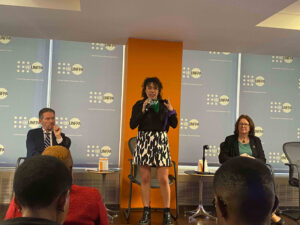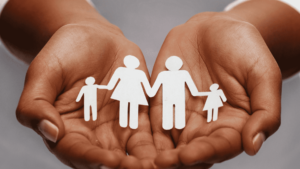by Grace Anaja
We attended the side event at the Sixty-Seventh Commission on the Status of Women (CSW67) which was held on Thursday, March 8 organised by the United Nations Population Fund (UNFPA) alongside other organisations and countries with the theme ‘Innovative and Digital Solutions to Gender Equality through Comprehensive Sexuality Education’.
The aim of the event was to provide a space for multi-stakeholder dialogue on how Comprehensive Sexuality Education (CSE) can help promote gender equality and the prevention of gender-based violence and harmful practices through digital technologies, as well as examples of using digital tools to reach out to a large scale of young people while protecting their safety online.
The event began with opening remarks from Mr. Ib Petersen, UNFPA Deputy Executive Director – Management, Eunice Garcia, Executive Director at Youth Coalition on Sexual and Reproductive Health and Rights, and Bjørg Sandkjær, State Secretary to the Ministry of Foreign Affairs, Norway.
Ib Patterson appreciated everyone for attending the event including partners, organisations and participants. He reiterated the importance of Comprehensive Sexuality Education, bodily autonomy and sexual and reproductive health and rights.
He mentioned the campaign by the UNFPA launched in November 2021, the body right campaign which is still ongoing, used to promote body rights just as there are copyrights online.
Comprehensive Sexuality Education is one of the most powerful tools to promote gender equality and the rights of women and girls. It helps many girls and young women around the world with the right knowledge about their health, rights and choices. It works to promote positive masculinity, where adolescent boys and young men can learn and respect equality and consent.
This is a digital age. Many people around the world spend several hours using digital technologies. Due to the pandemic, more people work remotely using laptops, desktops and smartphones. We have appointments, hold interviews and webinars online. We reach out to distant loved ones through video calls. What we do not easily see are the dangers that exist in using these digital tools – having one’s image taken and manipulated on social media, for instance, without permission or respect for privacy. It could lead to a loss of self-esteem and a feeling of powerlessness.
Statistics reveal that 85% of women worldwide have witnessed or experienced digital violence against other women. Cyber harassment, the feeling of being powerless online, can sometimes lead to depression. The virtual world must also be safe just like the real world.
Data also shows that there are over 70% of young people who have access to the internet and use digital technologies. They extensively use the digital environment as a key source of information about health, relationships, their sexuality and rights. Comprehensive Sexuality Education is crucial in supporting healthy behaviour and teaching learners how to be safe both online and offline. It empowers youths through human rights and gender transformative approaches to express bodily autonomy.
The digital tools for Comprehensive Sexuality Education help overcome the discomfort and shame learners and educators might experience while discussing sensitive issues in class. For the young person, it is less stressful to ask a question on the internet than face-to-face.
Eunice Garcia spoke about how relevant the youths are in the digital space. She stated the need to recognise the complexity of sexuality and how it goes beyond the biological aspect of reproduction and the physical act of sex. She mentioned that it is about the relationships we build with one another and how ethically we are building relationships with our peers. Young people need the tools to build relationships devoid of gender based violence, and in other spaces.

Undoubtedly, young people have been at the forefront of digital solutions for a long time and have not been recognised because of the lack of political will and the right tools handed to them. They have created content that addresses and provides the needed information on their sexual health; on understanding consent, abortion, building relationships and managing one’s mental health. This is instrumental in creating safe spaces for youths and has more value than regularised settings.
Bjørg Sandkjær stated the need for the knowledge about Comprehensive Sexuality Education and safe spaces, especially for young people so they can be able to make good decisions about their sexuality and their bodies.
There are gaps in access, economic gaps and gender gaps. Most people in low-income countries do not have access to basic internet connectivity. The digital gap may further increase the many inequalities that already exist between women and men, girls and boys.
Potentially, digitalisation has the power of access; access to knowledge and information which cannot be underestimated. It can help in expanding an individual’s sense of self and raise awareness of sexual and reproductive rights. The best ways to promote Comprehensive Sexuality Education include: access to websites that contain formal expert information and advice forums where both social media and video channels can be used; combining different scenarios for young people to reflect on what they see and hear and reflect on the information they have access to, and building communities with similar interests, focusing on those with disabilities, diverse sexual orientations or gender identities.
There were two panel sessions moderated by Nazneen Damji, UN Women Policy Advisor for Gender Equality, HIV and Health. The panelists for the global and regional session were Lindiwe Zulu, Minister of Social Development in South Africa, Cynthia Chinchilla Angel, AMAZE International Associate Director for Latin America and the Caribbean, and Fernanda Vazquez, Advocacy Officer, Elige, REDLAC. The country-specific panel session had Ruben Avila, Youth Program Officer, Fòs Feminista, Signe Gertz, UN Danish Youth Delegate and Marla from MariaLab.
They talked about how their countries and organisations are using digital technologies to advance Comprehensive Sexuality Education for youths and every other individual such as: setting up call centers for gender-based violence victims and survivors; creating educational videos on a wide range of topics around sexual health, mobile applications and e-learning platforms that provide evidence-based information; organising learning programs; addressing harmful practices, adultcentrism and unsupportive governments; leveraging other forms of media like traditional media; advocating for the fulfilment of human rights using digital tools and also creating non-digital resources.
Animations created by AMAZE International were shown before each of the panel sessions. One of the videos captured gender roles and stereotypes imposed on individuals by society based on their sex. AMAZE, as described by Cynthia Chinchilla Angel, is an initiative led by advocates for young people that uses fun animated videos for adolescents to deliver sexuality education. The initiative is implemented in about 50 countries and the videos are available in several languages. There are resources for parents and educators and the organisation works in collaboration with UNFPA to create country and region specific content. For instance, for Eastern and Southern Africa, they created videos addressing: the harmful practice of Female Genital Mutilation/Cutting, on accessing youth-friendly sexual and reproductive health services, on HIV, and other topics.
Governments are to be monitored and evaluated to ensure that policies concerning gender equality and the empowerment of women and girls are implemented. Laws and policies must be created to protect the vulnerable and criminalise perpetrators of gender-based violence. It is important to counter misinformation with evidence-based, medically accurate and age-appropriate information that can be trusted.
Digitalisation represents a great opportunity to reach young people with CSE. They must be empowered to navigate online spaces in a safe and informed manner, especially in accessing information regarding their sexual health.
The importance of CSE cannot be overemphasised. There is so much work to be done and this cannot be left to governments and civil societies. Every individual is encouraged to learn and speak about CSE, not just in formal settings but also at home, at work, in school and other spaces.








